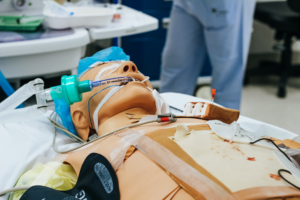
BSN to DNP Programs
By EveryNurse Staff on January 12, 2023

Whether you are an experienced nurse who wants to launch a career in advanced practice nursing, or a doctorally prepared APRN hoping to learn a new nurse practitioner specialty, a BSN to DNP program can jumpstart the next step in your career.
The Doctor of Nursing Practice (DNP) degree is a terminal practice-focused degree designed to prepare nurses for advanced clinical practice, united around a specific purpose or problem. The core competencies of the DNP degree promote excellence in direct patient care, teaching, research, and leadership. It is designed to advance the practice and leadership of nurses in all roles and settings.
Types of BSN to DNP Programs
If you are a registered nurse thinking about going into advanced practice, you have probably heard the buzz about big industry stakeholders, like the AACN, calling for a doctoral-level education (DNP) to become the requirement for advanced practice nursing. In response to these calls, many BSN to DNP programs have emerged, giving nurses several educational paths and areas of clinical specialization to choose from.
If you are a BSN credential RN, you can earn your DNP in the following areas:
- Adult-Gerontology Acute Care Nurse Practitioner (AG-ACNP)
- Adult-Gerontology Primary Care Nurse Practitioner (AG-PCNP)
- Executive Leadership (ENL)
- Family Nurse Practitioner (FNP)
- Nurse Anesthesia (CRNA)
- Nursing Education
- Nurse-Midwifery (CNM)
- Pediatric Nurse Practitioner (PNP)
- Psychiatric Mental Health Nurse Practitioner (PMHNP)
- Women’s Health Nurse Practitioner (WHNP)
Adult-Gerontology Acute Care Nurse Practitioner (AG-ACNP)
The AG-ACNP program track prepares graduates to provide evidence-based advanced patient care and leadership in the clinical specialty of acute and critical care, and is a recognized leader in professional nursing practice. The AG-ACNP uses the nursing process to guide and direct patient care and manages complex clinical situations with skill, confidence, knowledge, and technical expertise to improve outcomes in high-risk, acute, and critical care.
Adult-Gerontology Primary Care Nurse Practitioner (AG-PCNP)
The AG-PCNP track prepares graduates to provide evidence-based advanced patient care and leadership in the clinical specialty of primary care. As primary care providers, nurse practitioners focus on both holistic health promotion and disease prevention for individual patients across all age groups. They address acute problems as well as ongoing chronic diseases through effective diagnosis, treatment, education, counseling, coordination of care, and referral.
Executive Leadership (ENL)
BSN to DNP Executive Leadership programs prepare graduates for leadership roles in health organizations and the discipline of nursing. The ENL track prepares graduates to provide evidence-based advanced patient care and leadership in the clinical specialty of health care administration, including business planning, finance, reimbursement systems, quality improvement strategies, informatics protocols, health policy initiatives, workforce development models for advanced practice nurses, and interdisciplinary team management.
Family Nurse Practitioner (FNP)
BSN to DNP FNP programs prepare graduates to provide evidence-based advanced patient care and leadership in the clinical specialty of family health. FNPs address health promotion and disease prevention as well as the management of acute and chronic illnesses throughout the life span.
Nurse Anesthesia (CRNA)
BNP to DNP Nurse Anesthesia programs prepares graduates to provide anesthesia care for patients undergoing surgical or medical procedures that require sedation or anesthesia. CRNAs provide comprehensive anesthesia care in collaboration with anesthesiologists and other members of the surgical team. They administer nearly all types of anesthetics, monitor their patients’ responses, and deliver support for vital functions throughout the surgery.
Nursing Education
Nursing Education DNP programs prepare graduates for leadership roles in curriculum, instruction, and faculty development at the baccalaureate, graduate, and postgraduate levels. They are prepared to guide others in developing curricula; design educational strategies that meet the learning needs of various populations; promote evidence-based practice in clinical environments; provide leadership within the field of nursing education, and engage in scholarship to advance the body of nursing knowledge.
Nurse-Midwifery (CNM)
BSN to DNP Midwifery programs help students prepare for advanced practice in the clinical specialty of midwifery. Nurse-Midwives collaborate with physicians and other members of a healthcare team in providing preventive, intrapartum, postpartum, neonatal, adolescent, and women’s health care. CNMs address the needs of women throughout their lives but usually focus on pregnancy, childbirth, and postpartum care during a woman’s reproductive years.
Pediatric Nurse Practitioner (PNP)
BSN to DNP Pediatric programs help students prepare for advanced practice in the clinical specialty of pediatric nursing. Pediatric Nurse Practitioners focus their work on children, infants, and adolescents, addressing health promotion and disease prevention and the management of acute and chronic illnesses throughout childhood. Pediatric nurses also serve as advocates for children and their families, providing education and counseling in a variety of settings.
Psychiatric Mental Health Nurse Practitioner (PMHNP)
BSN to DNP PMHNP programs help students prepare for advanced practice in the clinical specialty of psychiatric mental health nursing. Psychiatric Mental Health Nurse Practitioners provide individualized, evidence-based assessment, diagnosis, treatment planning, intervention, consultation/liaison services, and case management for patients with psychiatric disorders.
Women’s Health Nurse Practitioner (WHNP)
BSN to DNP Women’s Health Nurse Practitioner programs help students prepare for advanced practice in the clinical specialty of women’s health nursing. WHNPs focus on promoting health and preventing disease in women, including those that are at risk or vulnerable due to their age, socio-economic status, sexual orientation, or gender identity. WHNPs also focus on promoting optimal health and preventing disease in women throughout their lifespan, focusing on primary care at both the ambulatory and inpatient settings.
Helpful Links
Online BSN to DNP Programs
Online BSN to DNP programs are typically designed to accommodate the needs of working nurses, with all or some portion of coursework being delivered online. Online nursing programs offer the same high-quality course content, exceptional faculty, comprehensive curriculum, and rigorous academic standards as their on-campus counterparts.
The format of the coursework may vary, but students enrolled in online BSN to DNP programs can expect to have a significant amount of time dedicated to independent study and research projects. Lecture content is delivered via streaming video over the internet, with supplemental materials provided through a learning management system (LMS). Students will typically participate in asynchronous discussions in course forums, with instructors available to help guide them through their studies.
BSN to DNP Program Requirements
Admission requirements for BSN to DNP programs vary from program to program. Among the most commonly required prerequisites are a prior degree in nursing, practice experience (i.e. an active, unencumbered RN license), English proficiency, and, in some cases, a satisfactory GRE score.
Details about the prerequisites required for each individual program are typically available through a school’s admissions webpage, or they can be obtained by making direct contact with the program’s admissions office.
Admissions Criteria for BSN Entry to DNP
- Applicants must have completed a bachelor’s degree in nursing from a nationally accredited college or university, documented by an official transcript
- Bachelor’s transcripts are expected to demonstrate a minimum GPA of 3.4 or higher
- Must hold an unencumbered registered nurse license in the state of residency where DNP project work will occur
- Non-native English speakers must present a Test of English as a Foreign Language (TOEFL) with a minimum score
- Resume or curriculum vitae that includes detailed work history and professional work activities
Helpful Resources for BSN to DNP Students
BSN to DNP Programs FAQ
BSN to DNP programs are intensive degree completion programs that typically take 36 to 48 months to complete when pursuing a full-time course load. The overall structure and content of a BSN to DNP curriculum will vary from program to program, but students can expect to spend substantially longer, between 48 to 84 months when pursuing a part-time course load.
The admissions criteria for DNP Programs include a bachelor’s degree in nursing and practice experience as a registered nurse. DNP Programs are advanced practice programs, so the expectation is that applicants will have a significant amount of experience as registered nurses before applying. So, it is true that you can get a DNP after your BSN, but not before you earn sufficient nursing practice experience to meet the requirements of the program you are applying to.
Students are not required to earn a Master’s Degree in Nursing to progress from BSN to DNP, however, most BSN to DNP Programs require applicants to have at least 1-3 years of clinical practice experience in the role of a registered nurse to qualify for admission. Thus, it is possible (from the standpoint of the DNP program requirements), for students to go from their BSN to DNP in a direct path, but it is not possible for students just graduating with their BSN to enroll immediately in a DNP program.
A DNP and NP can both deliver advanced practice nursing care in primary, acute, and specialized clinical settings. Both are qualified to work in clinical, administrative, and leadership roles due to their advanced practice training. The primary difference between the roles is that DNPs work to generate new clinical, scientific, and structural knowledge about the practice of nursing and the nursing industry in order to influence healthcare policy, whereas the focus of an NP is primarily on providing advanced care directly to patients.



